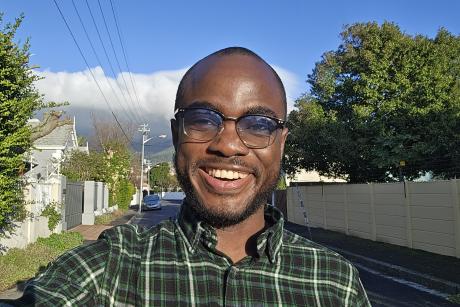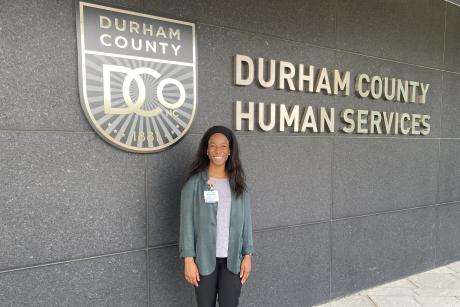Bidya Pant, M.D., remembers the moment he wanted to become an eye surgeon. He saw a hospital in Nepal turn away a blind man needing cataract surgery because it didn’t have resident eye surgeons, only outsiders who visited on medical tours or missions.
Pant went on to become one of the first partner surgeons for HelpMeSee, a nonprofit organization seeking to end treatable blindness worldwide. Since 2011, he’s performed more than 130,000 eye surgeries and opened six eye centers in South Asia.
But even Pant’s remarkable productivity has barely dented the need for accessible eye surgery. Globally, nearly 43 million people are blind due to conditions that could be fixed through procedures like catacact surgery.
“The main priority in countries isn’t eye care but malaria, cholera and other life-threatening diseases,” Pant said at a recent DGHI event. “We need to change our prospective about blindness.”
Pant joined other leaders in eye surgery at a DGHI Think Global event on Sept. 26 on preventable blindness. The talk, co-hosted by the DukeGlobal Ophthalmology Program and moderated by Lloyd Williams, M.D., Ph.D., a Duke eye surgeon and DGHI affiliate, underscored the significant socioeconomic and health benefits that could come from increasing global access to eye care and eye surgeries.
Geoffrey Tabin, M.D., a Stanford University professor and co-founder of the Himalayan Cataract Project, noted that ending blindness improves the lives of more than just the person who regains sight. He shared a picture of from South Sudan of a young boy leading a blind man with a stick. Restoring the man’s sight not only allows him to return to work, it frees the boy to attend school and pursue a career on his own, Tabin said.
“Once you do the surgery, the person is cured [for life],” he said. “There is almost no other fix like that in global health.”
Williams, who has performed thousands of cataract surgeries in Africa and Central America, said the procedure costs roughly $25 to perform, making it one of the most cost-effective interventions in global health.
“You see new life in an adult when the bandages come off,” Williams said. “When it’s a kid with blindness, it occurs to them right away, ‘I have a future now.’ That’s why we’re so passionate about what we do.”
In Sierra Leone, Williams has worked with Jalikatu Mustapha, M.D., the director of the country’s national eye program, to perform the first corneal transplants in the country. Mustapha said with just. A handful of trained ophthalmologists, Sierra Leone needs more training and facilities to expand access to eye care, especially for people who live in rural parts of the country.
Mustapha and her team are training more students and doctors to provide eye services. During the last two years, they’ve screened more than 40,000 people.
“Now, we are taking eye services to people by establishing regular camps to screen and treat them,” she said. “The primary healthcare workers are delivering the care to people at home.”
But Mustapha, who was recently appointed as the Deputy Minister of Health in Sierra Leone, echoed other panelists in saying that eye care needs to be better integrated into national health systems.
Asked how global health scholars and practitioners can help developing countries advance those goals, Mustapha advised students and researchers to seek input from local communities about what they need.
“Many developing countries depend on NGOs and partners to move the health sector forward,” she said. “It goes a long way when a partner asks us what we need and how they think they can help. It makes us feel confident to tell them, then tell our government and give that to the people.”
Williams noted the importance of having this discussion in a global health context, saying more collaboration is needed between ophthalmologists and the global health community.
“We want to invite all of you to partner with us in providing eye care,” he said. “Hopefully, you’ll invite us in the care that you’re doing so we can integrate eye and medical care together.”


